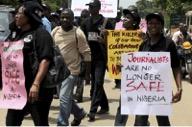PRESS REPRESSION THREATENS NIGERIA’S DEMOCRACY – JOURNALISTS’ BODY
Submitted by fkakooza on

The Committee to Protect Journalists (CPJ) warns that lack of press freedoms in Nigeria is a threat to the country’s democracy. According to the CPJ, a minimum of 14 journalists were detained, attacked or harassed while covering the February 2023 Nigerian general elections.
One of the attacked journalists was Dayo Aiyetan, the Executive Director of the International Centre for Investigative Reporting. Besides having his clothes torn, footage deleted and phone stolen, Aiyetan escaped death by a whisker after being nearly stabbed by unidentified men for doing what is enshrined in the country’s constitution. This is a blow to the eye of the media, yet press freedom is a key ingredient of democracy. Angela Quintal, the CPJ Africa Program Coordinator is worried that free and open coverage of elections enhances a democratic process. “Press freedom is an integral component of Nigerian democracy, and the media should be able to cover national polls without fear of reprisals,” she says.
In a democracy, press freedom is a key attribute, with the media having the responsibility to give relevant information for decision-making, questioning leaders and aspirants to public office, and exposing the ills during an election process.
Section 39 of the 1999 Constitution of the Federal Republic of Nigeria provides that “every person shall be entitled to freedom of expression, including freedom to hold opinions and to receive and impart information without interference.” Much as this is what the law ideally provides for, it is a far cry from what is happening on the ground.
Journalists Mistreated During Elections
Mr. Ikenna Ellis Ezenekwe, a journalist affiliated to 247ureports is a living testimony of the arbitrary arrests of media professionals. Mr. Ezenekwe was whisked away by the Nigerian Police on the morning of July 5th 2021, over an article on the website that put the former chief of staff to the former governor of Anambra state, Willie Obiano, Chief Primus Odili in the limelight for the wrong reasons. The reason for his arrest was that the article was libelous. “I endured a torrid time after I was taken to the police headquarters in Asokoro,” he recalls. “Firstly, I was subjected to interrogation in the absence of my lawyer and then I was incarcerated for several months without being arraigned in court. This is probably because I refused to identify the source of my article,” he adds. “I was coerced, intimidated and tortured but I stuck to my guns and said nothing to them,” Ezenekwe says.
Ezenekwe also contends that as a result of these threats and abuse of journalists, a new type of freedom of press has mushroomed in Nigeria and has consequently taken center stage. “There is what you call purchased freedom of press in Nigeria and I have faced my share of it,” he argues. However, he did not divulge details regarding this but it seems to speak to the price journalists have to pay for practicing their profession.
Fortune Fadaka, a Nigerian citizen and resident of Abeokuta in Ogun State believes that the situation has got out of hand and blames this on the politicians that want to show that they are people who have amassed power. She thinks that this should not be the case and it perplexes her that as long as the police have been paid, they can arrest and detain any journalist even on baseless accusations like invasion of privacy or refusal to reveal sources.
Elizabeth Senu, another Nigerian citizen believes that there is more to the absence of the freedom of the press than meets the eye. According to her, the Nigerian press is generally grappling with several challenges which if not ironed out, are a detriment to both their functionality and purpose.
“There are lots of problems facing the media like lack of adequate up-to-date facilities, corruption, tribalism, lack of strong ethical values of journalists, unemployment of trained experts and poor pay of the workers.”
Funisho Jimoh, a popular social media influencer in Nigeria narrated how he was arrested by the Nigerian police on 24th of February for his tweets that criticized the deployment of security at the polling unit where he was to vote from. Upon the arrest, Funisho’s phone was crushed into pieces, his clothes torn as he was being forced into custody. He was also asked by the police to reveal the candidate he worked for, which he didn’t. He was brutally tortured.
According to a report from HumAngle media, there are many other journalists who were further harshly treated and arbitrarily arrested during the 2023 Nigeria’s elections.
- 537 reads
